The ‘Achieving Clinical Excellence’ Newsletter
Creation of regular newsletters sharing learning from morbidity and mortality meetings in a concise and engaging way for all members of the paediatric multidisciplinary team.
The Initial Problem and its Impact
Morbidity and mortality meetings help identify areas for improvement for patient safety and patient care. At the Paediatric Department at West Middlesex University Hospital, this is rebranded as monthly Achieving Clinical Excellence (ACE) meetings to also incorporate positive aspects of patient care. This provides an avenue for valuable learning from significant events including, but not limited to, patient retrievals, deaths and complex rare presentations. However, due to constraints from rota patterns and clinical demand, variable attendance to these meetings resulted in a missed opportunity for learning. When surveyed, only 57% of the paediatric team were able to attend at least one meeting every 2-3 months whilst 10% had never attended an ACE meeting. Unsurprisingly, 90% of staff did not gain any learning from meetings which they were unable to attend.
Project Aim
Our aim was to find a way to summarise and disseminate the learning from cases discussed with the rest of the paediatric multidisciplinary team, which would enable the sharing of key learning points and identification of areas for improvement. We wanted to do this in a concise and engaging way to encourage all team members to participate, and to make the information easier to retain. This led to the creation of an ACE newsletter.
Stakeholders
West Middlesex Paediatric Team
Patients, parents and carers
Clinical Governance team
PDSA Cycles / Solution(s) Tested
PDSA Cycle 1
The newsletter team (2 SHOs, 1 registrar, 1 consultant) worked to create a monthly newsletter. To ensure it was easy to read and improve retention of information, the team decided to keep the newsletter to a single side of A4 covering the key learning points from cases discussed during the monthly ACE meetings. These included clinical learning, unfamiliar clinical protocols and advice on how to approach challenging clinical scenarios. The newsletter was distributed to members of the paediatric medical team with the weekly teaching bulletin via email. The initiative received good feedback and was mentioned in the paediatric clinical governance meeting and paediatric grand rounds. 100% of the paediatric team surveyed found the newsletter a useful summary. Suggestions were sought on ways to increase its reach and improve the content to cater to different learning needs.
Examples of the initial ACE newsletters below:
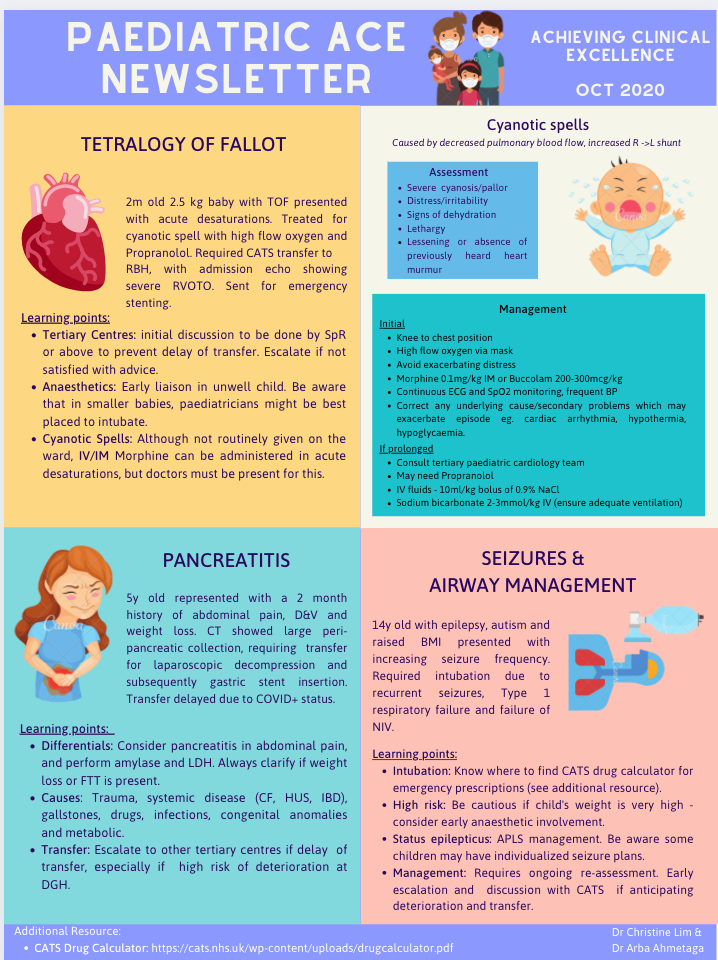
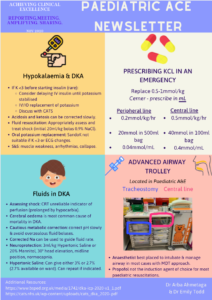

PDSA Cycle 2
We incorporated suggestions on including major journal papers as well as including situational awareness and human factors that contributed to cases. We also included a QR code to a useful clinical application. In order to reach a wider audience, the ACE newsletter was also displayed in the paediatric seminar room and paediatric ward noticeboard. A survey of the nursing staff on the paediatric ward and emergency department (ED) revealed similar missed learning opportunities (89% had never attended an ACE meeting) and sought feedback on dissemination, structure and content. Suggestions such as including the paediatric ED and nursing staff email groups in our distribution of newsletters were carried out. At this point in the project, the newsletter had also become a platform where key learning points from Serious Incidents (SI) investigations could be shared.
Examples of subsequent ACE newsletters incorporating the above suggestions:
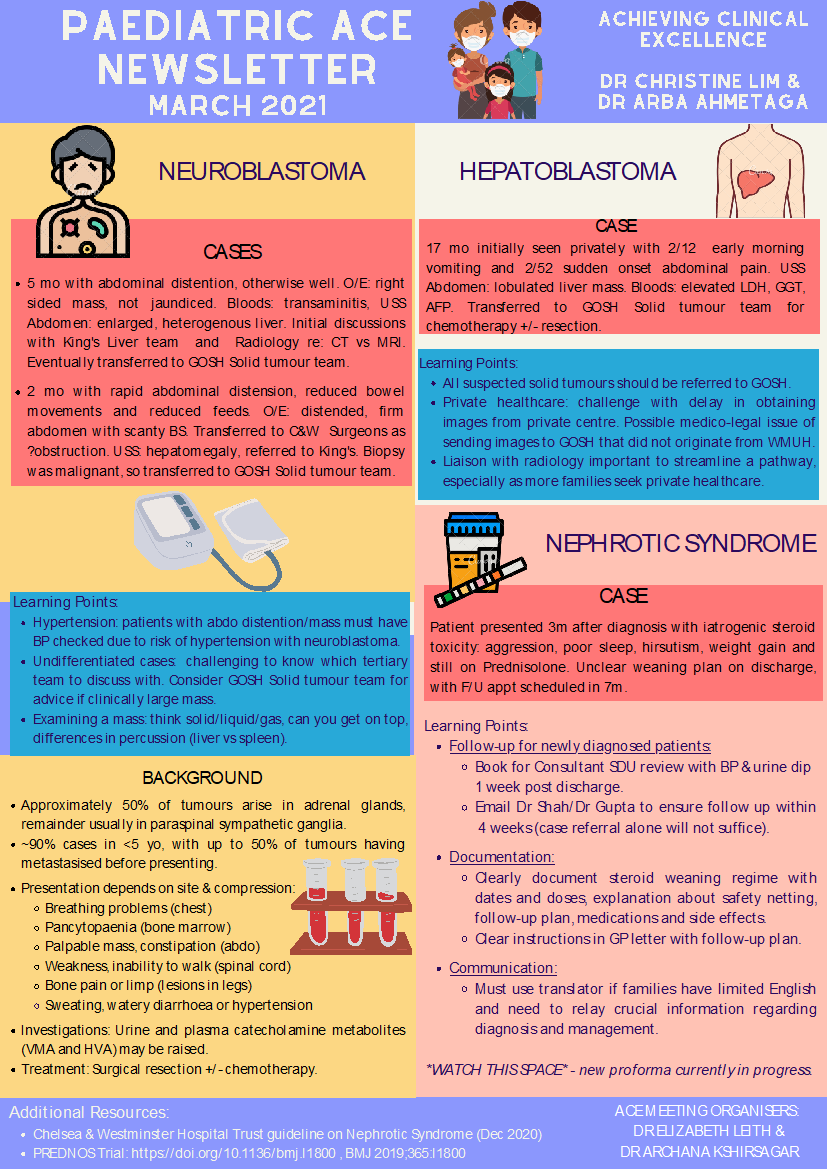
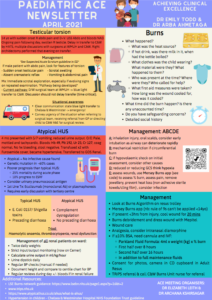
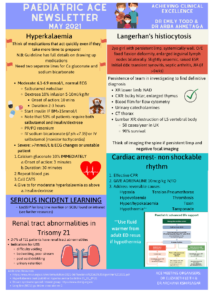
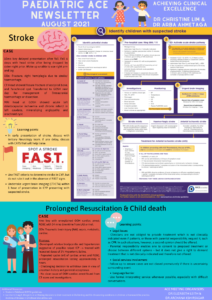
Challenges and Learning
Our main challenge was to create an appropriate team to ensure the workload was manageable which would therefore guarantee the sustainability of the project. We created a small, close-knit team of 1 registrar and 2 SHOs to share the workload and ensure consistency between the monthly newsletters. Each SHO drafted one newsletter (approximately 1 hour of work) every month, whilst the registrar edited each one (approximately 1 hour of work). The consultant reviewed the final draft before it was disseminated with the teaching bulletins.
Our biggest challenge going forward is handing over the project as new trainees rotate into the department. We have handed over the project in detail to a new team which will be supervised by the same consultant, but it will still rely on passionate and dedicated trainees who are willing to contribute their personal time to create the monthly newsletters.
The next challenge was the very reason we set up the project – what if nobody from the newsletter team was able to attend the ACE meeting? There is always an SHO in attendance and so we asked whichever colleague was able to attend to take brief notes of the discussion that took place. Along with the PowerPoint presentations, we were reliably able to gather the key learning points in this way.
Finally, we needed to ensure that the newsletter engaged its audience. We were adamant that the newsletter remained a single side of A4 to increase information retention and uptake of readership. At times it proved challenging to balance the inclusion of important learning points in an eye-catching and engaging way, whilst remaining concise and succinct. The feedback we received from the team however showed that we had achieved this with each newsletter. On reflection, this project has been a great way to hone our skills in presenting information in a readable format.
Further Steps
We hope that the ACE newsletters are a useful initiative to share knowledge and highlight the importance of identifying areas of improvement from significant events. We hope that the newsletter will undergo further iterations with regular feedback and analysis to ensure its suitability and effectiveness for the targeted audience. We aim for this initiative to identify areas of improvement within the department and to start the process of developing other quality improvement projects to address these areas.
Reflections
The ACE newsletter was a project addressing the missed opportunity for learning for paediatric medical and nursing staff at West Middlesex University Hospital. Working on a trainee-led project that has brought about a significant change in the department which has been so well received by our team has been empowering for all of us. The project has provided great exposure to clinical governance, has given trainees the opportunity to drive change in their department, and has provided experience in leadership and management for the lead registrar.
Authors: Christine Lim, Emily Todd, Arba Ahmetaga, and Archana Kshirsagar
Organisation: West Middlesex University Hospital, Chelsea and Westminster Hospital NHS Foundation Trust
Published: October 2021
